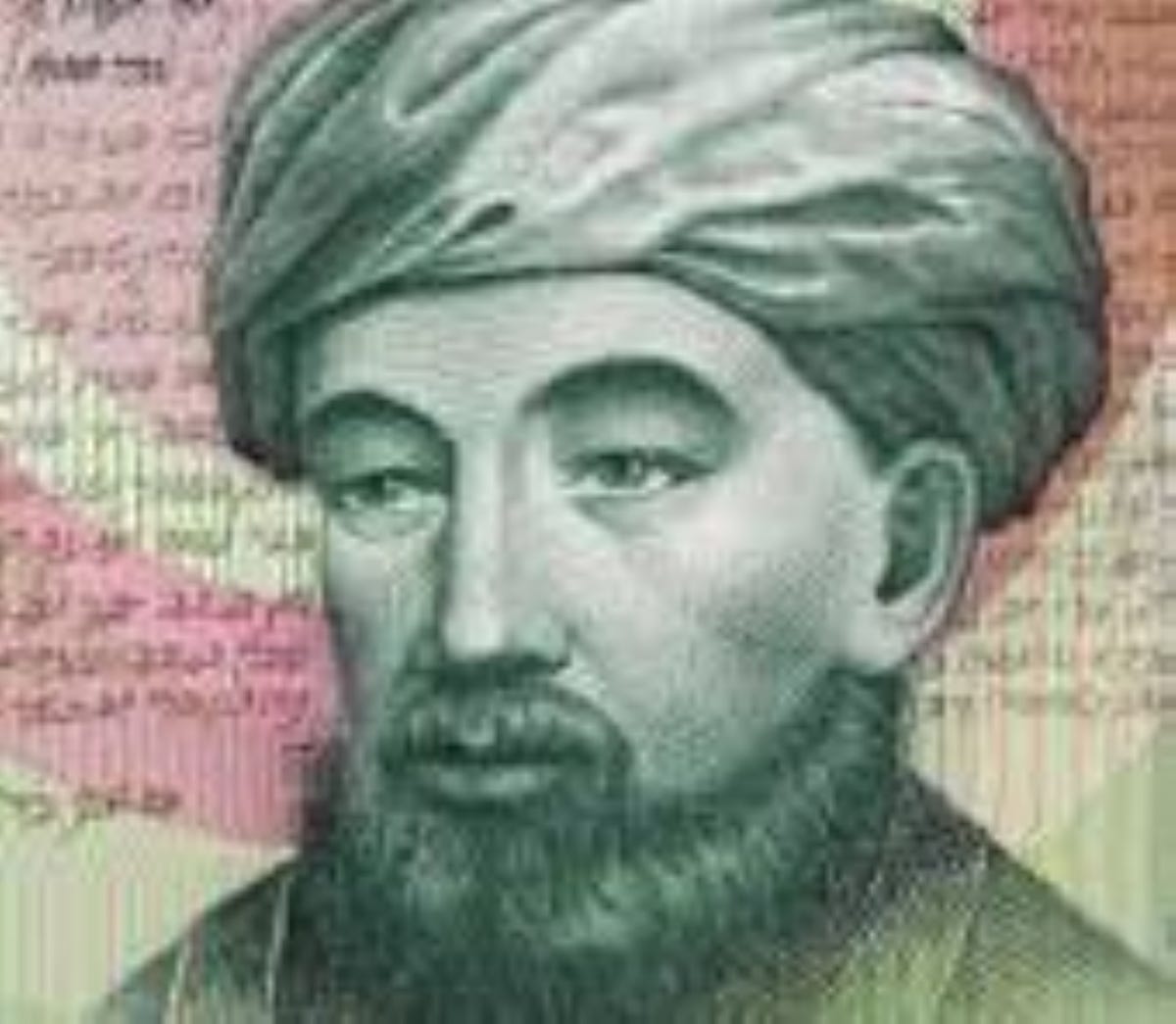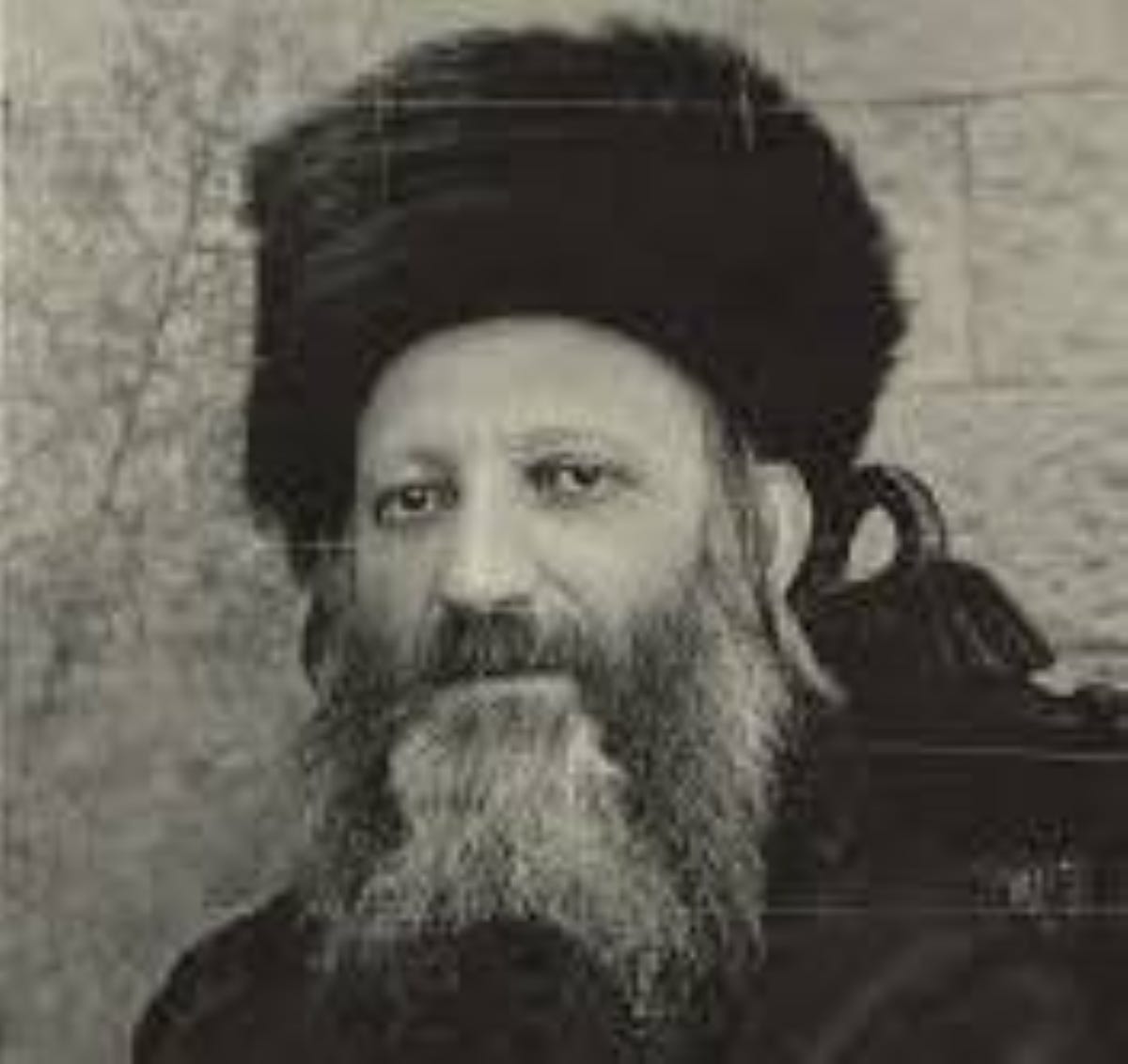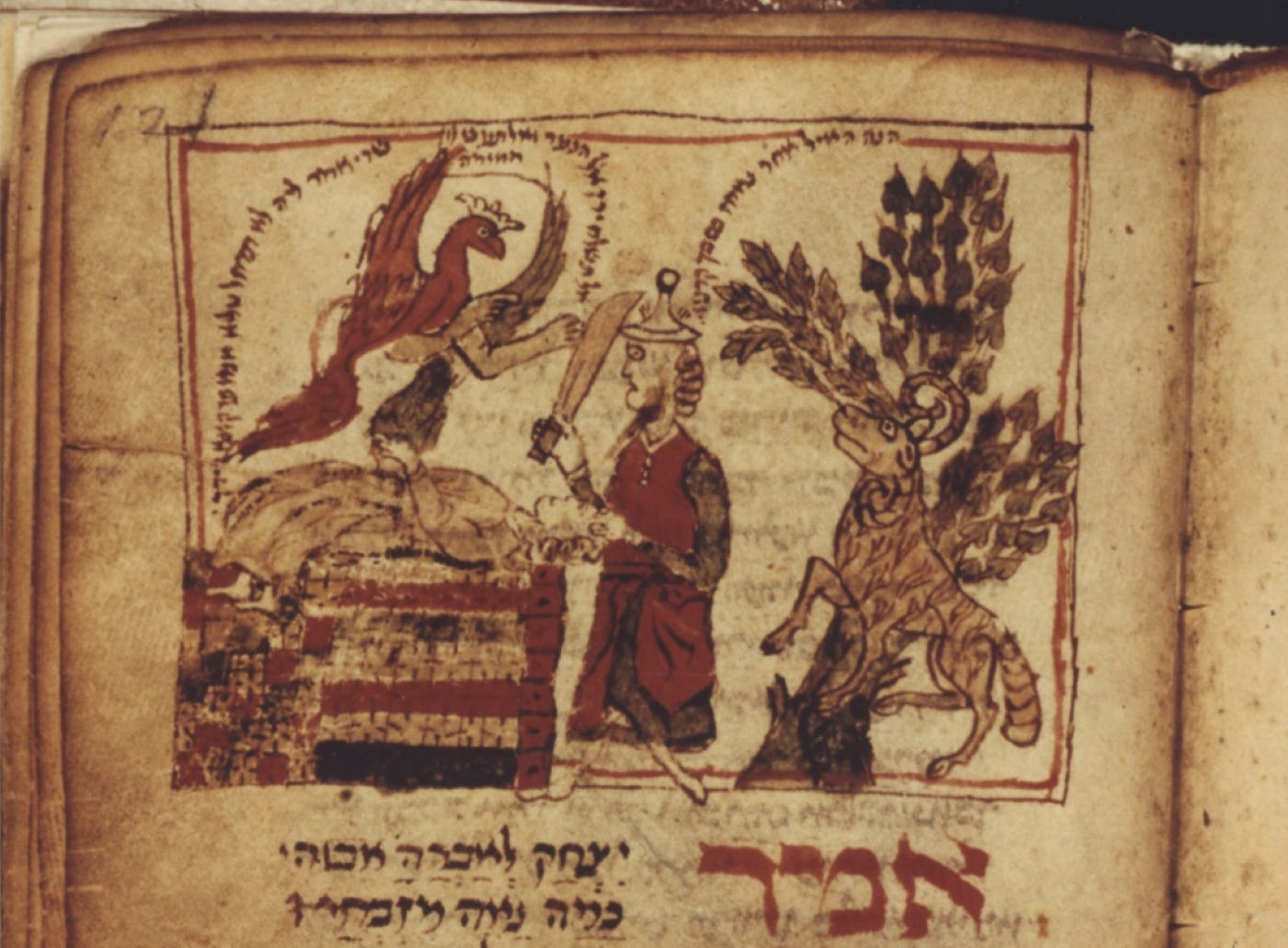The Jews' Biblical Right to The Land
"Akeidah is Mandatory for Inheriting Israel" - a guest post
by Rabbi Moshe Taragin, Yeshivat Har Etzion and the Orthodox Union
Originally published in Issue 1587, week of November 24, 2024 in Torah Tidbits, a weekly magazine of the Orthodox Union, this article spells out why the descendants of Isaac—Yitzchak in Hebrew—rather than those of Avraham’s older son, Yishmael, inherited the Land of Israel. Information in parentheses was added by me because of this blog’s diverse readership. Reprinted with permission. …In honor of the ram Abraham sacrificed instead of Isaac, I have included a fabulous lamb recipe at the end.
The Akeidat Yitzchak (the Binding of Isaac, Genesis 22:1-19) is an epic moment in Jewish history, etched deeply into our collective imagination. It forms the bedrock of our prayers, especially on Rosh Hashana, when we implore Hashem (G-d) to consider the enduring merits of Avraham and Yitzchak’s heroism and courage. As the Rambam (Rabbi Moses ben Maimon or Maimonides, b. around 1136, d. 1204) articulates (Moreh Nevuchim) the akeidah affirms the authoritative power of prophecy. Avraham, absolutely certain that he had received the directly revealed word of Hashem, was prepared to offer his son—an act he would never have undertaken otherwise.
Additionally, as Rav Kook (Rabbi Abraham Isaac Kook, 1865-1935) observed, the akeidah demonstrated that belief in an invisible and unknowable G-d need not diminish religious fervor. Avraham convinced the world of a G-d beyond human comprehension, yet the question remained: could man truly engage emotionally with a distant G-d? Perhaps intermediaries, like stars or idols, were necessary to bridge the gap between the divine and mortal man. Through the akeidah, Avraham proved that even an unknowable G-d could still inspire the deepest human passion and love.
Pilgrimage
Yet, the akeidah holds another pivotal place in Jewish history. Though Avraham had previously journeyed through the surrounding areas of Yerushalayim (Jerusalem), this visit brought him to the place specifically known as Shalem, where Malki Tzedek (Melchizedek) served as both king and priest. This first excursion did not secure him the divine right to the city.
The akeidah represents the pilgrimage of Avraham and Yitzchak to an empty, desolate terrain. Through this journey, they claim Yerushalayim on behalf of their descendants. Having accompanied his father to the akeidah, Yitzchak inherits the Land; those who did not partake in the akeidah will not inherit Israel.
Yishmael wasn’t at the akeidah
This is especially significant, as immediately before this trip Yishmael had been sent away from the family. Yishmael had shared in many of Avraham’s defining moments: he underwent Brit Milah (ritual circumcision), witnessed the arrival of angels, and watched as his father championed justice against the annihilation of potentially innocent lives in Sedom (Sodom). Having experienced these profound events, theoretically, Yishmael and his descendants were candidates to become part of Hashem’s chosen people and to inherit the Land of Israel. Yet, Yishmael never made the akeidah pilgrimage to Yerushalayim and his absence sealed his destiny. Only those who journeyed to the mountain inherited the divine legacy of the Land.
The akeidah holds such immense significance and such crucial historical implications that Islamic tradition has gone to great lengths to assert that it was Yishmael, not Yitzchak, who was bound on the alter, despite the clear and unambiguous reference in the Torah to Yitzchak. This shift in narrative merely reinforces the truth that without partaking in the akeidah, the divine claim to the Land of Israel remains unattainable.
The akeidah imparted lessons which were pivotal to inheriting the Land of Israel. Having never set foot in Yerushalayim nor established the cornerstones of religion there, Yishmael and his descendants are excluded from inheriting the Land of Hashem. At the akeidah, Yitzchak learned profound lessons about G-d, belief, and the dedication needed to settle Eretz Yisrael (the Land of Israel). The akeidah prepared him and us for a life bound to Israel’s covenantal mission.
This is not a religion of death
Hashem orchestrated the akeidah to bring Avraham to the brink of human sacrifice, only to debunk the idea that Hashem desires blood or death. The principal purpose of the akeidah was to eradicate the ancient notion that religion demands human sacrifice. To repudiate this dark cultural belief, Avraham had to go through the motions—fully believing he was called to sacrifice a human life to Hashem—only to be stopped at the last possible moment. A voice came from heaven:
אל תשלח ידך אל הנער ואל תעש לו מאומה
(Do not stretch out your hand on the lad and do not do anything to him.)
Not only was he forbidden from sacrificing his son, but he was also prevented from even drawing blood (as Rashi [Rabbi Shlomo Yitzchaki, 1040-1105] notes). Hashem does not desire death, does not seek blood, and does not wish for suffering.
Yishmael did not attend the akeidah, and that culture never fully learned this basic tenet of religion: Hashem does not desire death. Not of His adherents, and certainly not of innocent people. There is no joy in heaven when the innocent suffer or die. In a similar vein, Judaism does not aspire to martyrdom, and we are not meant to pursue a death wish. We are placed on this earth to represent Hashem through the lives we lead, lives that reflect the nobility of a covenantal existence. Under certain extreme circumstances, we are called to preserve His name and His presence, even at the point of death. But death is never the endgame or the ultimate goal. If we truly care about Hashem, if we truly love Him beyond our own lives, we must be prepared, if called upon, to sacrifice our lives on His behalf. We strive to represent His divine will through every facet of our lives, and if called upon, we are prepared to give all to uphold His presence.
Yishmael never attended the akeidah. Having missed out on this lesson as well, his descendants developed a religion that, in many instances, glorifies death and Shahidism and believes that G-d takes sadistic pleasure in the suffering of His creatures. This culture cannot inherit the Land of Hashem.
Transcendence
The akeidah established the unknowability of Hashem, affirming that He and His wisdom lie beyond human comprehension. Avraham spent his entire life revealing a G-d of mercy, who desired human welfare. He didn’t find Hashem through pure intellect or science but sensed a moral spirit permeating the world. Avraham perceived a harmony between divine will and human interest, and he preached a revolutionary religion—a belief in a compassionate Hashem who valued human well-being.
At the tail end of his career, the akeidah taught Avraham—and, through him, all of humanity--that Hashem and His ways cannot always be understood. No human logic or moral code could ever justify the sacrifice of another person, much less one's own child. This became Avraham’s final lesson: as much as we think we know Hashem, we cannot fully grasp Him. Until we understand that we cannot know Him completely, we don’t truly know Hiim at all. This lesson in divine transcendence is foundational to faith—and even more crucial to life in the Land of Hashem.
Settling in Israel will never be bound by human logic. The laws that govern every other land do not apply to the Land of Hashem and to life under His watchful eye. Living in the Land of Israela demands a recognition that it operates on a scale beyond human proportions, guided by forces beyond our understanding. It is, by nature, baffling and mysterious.
We are often baffled by so many aspects of our return. After 2,000 years of enduring faith, why has our return been so arduous and torturous? Why aren’t more of our people classically religious and halachically (according to traditional Jewish law) observant? Why have we faced such fierce hostility and violence? These questions have only intensified since October 7th.
The akeidah remains our ticket of entry into settling the Land of Israel. If Avraham could stand in Yerushalayim and suspend his moral code and logical thinking, then we, too, must find within ourselves an undying and unwavering faith.
Peace treaties and human welfare
It wasn’t only what transpired atop the mountain that sealed our right to Israel. It was also the lessons Yitzchak witnessed in the events that preceded and followed the akeidah. Prior to the akeidah, Avimelech (Abimelek), a warlord from the coast, visits Avraham, flanked by his renowned general, Phichol. Though his words are courteous, an undercurrent of ominous threat lingers in his tone. He urges Avraham to form a treaty rather than face the potential consequences of military conflict.
This encounter concludes peacefully, with Avraham forging a treaty with Avimelech to live side by side in harmony. The city of Be’er Sheva—where the oath (shevu’ah in Hebrew) was taken and where seven (sheva in Hebrew) animals were sacrificed as part of the treaty ceremony—stands as a lasting testament to this agreement. This moment teaches us that we are meant to inspire the world, not conquer it or impose our beliefs upon others. Avraham could have easily defeated Phichol’s armies with Hashem’s help. However, life in Israel is meant to inspire, not to persecute.
In parshat Chayei Sarah (Genesis 23:1-25:18), after the akeidah, two things shift. First, Avraham exports his religious revolution internationally, sending his servant to his homeland to expose his past family to the ways of Hashem. Additionally, his servant comes bearing many gifts and treasures, symbolizing Avraham’s broader mission: to be a source of human welfare and progress. Avraham’s legacy is not just to inspire the world, but to enrich and elevate it.
Yitzchak witnessed these two sagas—the treaty with Avimelech and the journey of Avraham’s servant to Aram Nahara’im. He saw his father striving for peace, choosing diplomacy over the path of war and conquest. He also witnessed Avraham extending welfare to others, seeking harmony rather than dominance. This has become the legacy of Yitzchak’s descendants—looking for peaceful relations and contributing to the betterment of the world. We are placed in Israel, not only for our own benefit but to provide general welfare to all humanity:
והיה ברכה
(Be a blessing)
In the modern era, as we rejoined the global community, Jews have often stood at the forefront of human progress and innovation, driving forward rapid advancements across diverse fields. With our return to Israel, we are continually fulfilling the vision of ve’heye beracha (the Hebrew above)—becoming a source of blessing for the world.
Unlike Yitzchak, Yishmael was absent from both the peace treaty with Avimelech and the welfare mission to Aram Nahara’im. As a result, his descendants have made limited contributions to the sweeping advancements of modern civilization, having focused on conquest over collective development. Yishmael’s descendants established a culture shaped by conquest rather than collaboration, prioritizing dominion over others rather than collective progress and cooperation.
The akeidah, along with the episodes immediately surrounding it, reveals core principles of faith that are fundamental to the challenges of living in Israel. It teaches us that Hashem does not desire death, while also emphasizing that He is unknowable. Only those who stood on that mountain, absorbing these profound lessons, can inherit this Land. Yitzchak attended the akeidah. Yishmael did not.
Cumin-Lamb Meatballs with Tahini Sauce
I first had these meatballs at an Israeli-style fast-food restaurant in the building that also houses government offices in Akko, Israel, a few weeks after I arrived in Israel. I expected something that would stop the hunger; I certainly didn’t expect to be wowed. These are delicious with ground beef, but are spectacular made with lamb.
Serves 4
Garlic Paste
1 to 2 garlic cloves, crushed
pinch of table salt
Meatballs
1-1/4 tsp. kosher salt (coarse salt)
1 pound ground lamb or beef
1 green onion, minced
1 Tbsp. fresh parsley, minced
2 tsp. cumin seeds or 1.5 tsp. of powdered cumin seeds
1/8 tsp. cayenne pepper or hot moroccan paprika, or to taste (use caution!)
black pepper, to taste
1/2 tsp. chili powder
Dressing
Half the garlic paste made (above)
1/4 c. tahini
1/4 tsp. salt
Fresh lemon juice, to taste
Water
Olive oil for pan
1 Tbsp. chopped parsley, for garnish
Hot sauce, optional
Directions
Preheat the broiler. You want the oven rack to be about 3 inches below the burner.
Pound the garlic and a pinch of table salt to make a paste. Put half in a large bowl and set the rest aside.
Add all the meatball ingredients to the bowl with the garlic paste. Mix thoroughly.
Grease a rimmed baking sheet with a little olive oil or olive oil spray. Shape meatballs into walnut-sized balls. Place on the pan, leaving a generous amount of space between them. Broil for 8 to 10 minutes, or until browned on top but still slightly pink inside.
While these are cooking, make the dressing by mixing the rest of the garlic paste, tahini, salt, and lemon juice. If you have never made tahini sauce, note that it mixes strangely. The lemon juice will turn it from cream colored to white, but it will make it stiffer. Keep mixing. Then add water, a little at a time, mixing well between, until it has the consistency you want.
Put the meatballs on a serving dish and garnish with the chopped parsley. Serve with the tahini dressing. You might also like hot sauce with it. The Moroccan way of serving is with rice and salad(s).





wonderfully written! Hanna, I am not sure I understood all of this but some of it and I truly do believe Jews belong in Israel, no matter what. Also, I want to send you a donation but I need to know how. Credit card, cash, check??? Thank you so much for all you do!